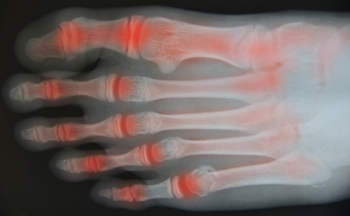Items filtered by date: January 2019
High Heels and Morton’s Neuroma
 High heels have become a normal part of many women's lives. Unfortunately, wearing high heels too often can lead to health complications. One of these health complications is Morton’s neuroma, which is a complication involving swelling along a nerve in the foot. This swelling results in burning pain, numbness, and tingling. This affliction is more common in women than men, which might be because it is more common for women to wear high heels. High heels put the foot in an unnatural position and push toes together. Wearing high heels often, can lead to subtle bone shifts that increase the risk for a neuroma to form. Usually, the discomfort caused by this condition can be briefly relieved by taking off your shoes and moving your feet around. Continuing to wear high heels for extended periods of time will aggravate your foot and cause the symptoms to come back. If you feel that you may have a Morton’s neuroma, then it is suggested you speak with a podiatrist about proper treatment methods.
High heels have become a normal part of many women's lives. Unfortunately, wearing high heels too often can lead to health complications. One of these health complications is Morton’s neuroma, which is a complication involving swelling along a nerve in the foot. This swelling results in burning pain, numbness, and tingling. This affliction is more common in women than men, which might be because it is more common for women to wear high heels. High heels put the foot in an unnatural position and push toes together. Wearing high heels often, can lead to subtle bone shifts that increase the risk for a neuroma to form. Usually, the discomfort caused by this condition can be briefly relieved by taking off your shoes and moving your feet around. Continuing to wear high heels for extended periods of time will aggravate your foot and cause the symptoms to come back. If you feel that you may have a Morton’s neuroma, then it is suggested you speak with a podiatrist about proper treatment methods.
Morton’s neuroma is a very uncomfortable condition to live with. If you think you have Morton’s neuroma, contact Dr. Tupper of Coshocton Foot Health Center. Our doctor will attend to all of your foot care needs and answer any of your related questions.
Morton’s Neuroma
Morton's neuroma is a painful foot condition that commonly affects the areas between the second and third or third and fourth toe, although other areas of the foot are also susceptible. Morton’s neuroma is caused by an inflamed nerve in the foot that is being squeezed and aggravated by surrounding bones.
What Increases the Chances of Having Morton’s Neuroma?
- Ill-fitting high heels or shoes that add pressure to the toe or foot
- Jogging, running or any sport that involves constant impact to the foot
- Flat feet, bunions, and any other foot deformities
Morton’s neuroma is a very treatable condition. Orthotics and shoe inserts can often be used to alleviate the pain on the forefront of the feet. In more severe cases, corticosteroids can also be prescribed. In order to figure out the best treatment for your neuroma, it’s recommended to seek the care of a podiatrist who can diagnose your condition and provide different treatment options.
If you have any questions, please feel free to contact our office located in Coshocton, OH . We offer the newest diagnostic and treatment technologies for all your foot care needs.
How Obesity Affects Your Feet and Ankles
 Obesity leads to increased risk for many chronic health issues. Your feet and ankles are especially susceptible to these risks because carrying extra weight puts a heavy strain on them. Ankles are weight bearing joints, so they tend to be one of the first parts of the body to experience discomfort from weight gain. Some examples of obesity related health issues that affect the ankles are weakened tendons and ligaments, increased risk of ankle sprain, and posterior tibial tendonitis. Obesity can lead to serious health complications in your feet such as, neuropathy, gout, osteoarthritis, osteoporosis and diabetes. If you are concerned for the health of your feet in relation to obesity, then it is recommended to speak with a podiatrist for additional information and treatment options.
Obesity leads to increased risk for many chronic health issues. Your feet and ankles are especially susceptible to these risks because carrying extra weight puts a heavy strain on them. Ankles are weight bearing joints, so they tend to be one of the first parts of the body to experience discomfort from weight gain. Some examples of obesity related health issues that affect the ankles are weakened tendons and ligaments, increased risk of ankle sprain, and posterior tibial tendonitis. Obesity can lead to serious health complications in your feet such as, neuropathy, gout, osteoarthritis, osteoporosis and diabetes. If you are concerned for the health of your feet in relation to obesity, then it is recommended to speak with a podiatrist for additional information and treatment options.
Obesity has become very problematic at this point in time and can have extremely negative effects on the feet. If you’re an obese individual and are concerned about your feet, contact Dr. Tupper from Coshocton Foot Health Center. Our doctor can provide the care you need to keep you pain-free and on your feet.
Obesity and Your Feet
Since your feet are what support your entire weight when standing, any additional weight can result in pain and swelling. Being overweight is one of the main contributors to foot complications.
Problems & Complications
Extra Weight – Even putting on just a few extra pounds could create serious complications for your feet. As your weight increases, your balance and body will shift, creating new stresses on your feet. This uneven weight distribution can cause pain, even while doing the simplest tasks, such as walking.
Diabetes – People who are overweight are at serious risk of developing type-2 diabetes, which has a drastic impact on the health of your feet. As you get older, your diabetes might worsen, which could lead to loss of feeling in your feet, sores, and bruises. You could also become more prone to various infections.
Plantar fasciitis – Pressure and stress that is placed on muscles, joints, and tendons can trigger plantar fasciitis, which is an inflammation of tissue that forms along the bottom of the foot.
If you have any questions please feel free to contact our office located in Coshocton, OH . We offer the newest diagnostic and treatment technologies for all your foot and ankle needs.
Toe Arthritis May Be Common
 A common part of the foot where arthritis may develop is the toes. There are several joints that are located in the toes, and if inflammation should occur, arthritis may develop. This may typically cause severe pain and discomfort. There are several reasons why patients may develop toe arthritis, and these can include becoming overweight, hereditary factors, or the natural aging process. Additionally, women who choose to wear shoes that do not provide adequate room for the toes to move freely may also develop this uncomfortable foot condition. Many patients experience pain as the first symptom, and this may hinder performing everyday activities. Other symptoms may include swelling in and around the joints in the toes, possible stiffness as a result of diminished cartilage between the joints, or heat emanating from that area of the foot. If you believe you have the beginning stages of arthritis developing in your toes, speak with a podiatrist who can properly examine your condition.
A common part of the foot where arthritis may develop is the toes. There are several joints that are located in the toes, and if inflammation should occur, arthritis may develop. This may typically cause severe pain and discomfort. There are several reasons why patients may develop toe arthritis, and these can include becoming overweight, hereditary factors, or the natural aging process. Additionally, women who choose to wear shoes that do not provide adequate room for the toes to move freely may also develop this uncomfortable foot condition. Many patients experience pain as the first symptom, and this may hinder performing everyday activities. Other symptoms may include swelling in and around the joints in the toes, possible stiffness as a result of diminished cartilage between the joints, or heat emanating from that area of the foot. If you believe you have the beginning stages of arthritis developing in your toes, speak with a podiatrist who can properly examine your condition.
Arthritis can be a difficult condition to live with. If you are seeking treatment, contact Dr. Tupper from Coshocton Foot Health Center. Our doctor can provide the care you need to keep you pain-free and on your feet.
Arthritic Foot Care
Arthritis is a term that is commonly used to describe joint pain. The condition itself can occur to anyone of any age, race, or gender, and there are over 100 types of it. Nevertheless, arthritis is more commonly found in women compared to men, and it is also more prevalent in those who are overweight. The causes of arthritis vary depending on which type of arthritis you have. Osteoarthritis for example, is often caused by injury, while rheumatoid arthritis is caused by a misdirected immune system.
Symptoms
- Swelling
- Pain
- Stiffness
- Decreased Range of Motion
Arthritic symptoms range in severity, and they may come and go. Some symptoms stay the same for several years but could potentially get worse with time. Severe cases of arthritis can prevent its sufferers from performing daily activities and make walking difficult.
Risk Factors
- Occupation – Occupations requiring repetitive knee movements have been linked to osteoarthritis
- Obesity – Excess weight can contribute to osteoarthritis development
- Infection – Microbial agents can infect the joints and trigger arthritis
- Joint Injuries – Damage to joints may lead to osteoarthritis
- Age – Risk increases with age
- Gender –Most types are more common in women
- Genetics – Arthritis can be hereditary
If you suspect your arthritis is affecting your feet, it is crucial that you see a podiatrist immediately. Your doctor will be able to address your specific case and help you decide which treatment method is best for you.
If you have any questions, please feel free to contact our office located in Coshocton, OH . We offer the newest diagnostic and treatment technologies for all your foot care needs.
Children and Ingrown Toenails
 If your child complains of an irritation on the side of her big toe, they may have what is known as an ingrown toenail. The typical reasons why this condition may occur can be from wearing shoes that do not fit correctly and provide inadequate room for the toes to move freely in, and toenails that are trimmed improperly. Additionally, some children may pick at their toenails, and this type of action may lead to developing ingrown toenails. Some of the uncomfortable symptoms that are associated with this condition may be tenderness around the edge of the toenail, swelling and redness. If this ailment is not treated promptly, a painful infection may occur when bacteria enters the body through small cuts in the skin. It’s important to obtain a prompt and proper diagnosis, and this can be accomplished by consulting a podiatrist who can also assist in beginning correct treatment.
If your child complains of an irritation on the side of her big toe, they may have what is known as an ingrown toenail. The typical reasons why this condition may occur can be from wearing shoes that do not fit correctly and provide inadequate room for the toes to move freely in, and toenails that are trimmed improperly. Additionally, some children may pick at their toenails, and this type of action may lead to developing ingrown toenails. Some of the uncomfortable symptoms that are associated with this condition may be tenderness around the edge of the toenail, swelling and redness. If this ailment is not treated promptly, a painful infection may occur when bacteria enters the body through small cuts in the skin. It’s important to obtain a prompt and proper diagnosis, and this can be accomplished by consulting a podiatrist who can also assist in beginning correct treatment.
Ingrown toenails may initially present themselves as a minor discomfort, but they may progress into an infection in the skin without proper treatment. For more information about ingrown toenails, contact Dr. Tupper of Coshocton Foot Health Center. Our doctor can provide the care you need to keep you pain-free and on your feet.
Ingrown Toenails
Ingrown toenails are caused when the corner or side of a toenail grows into the soft flesh surrounding it. They often result in redness, swelling, pain, and in some cases, infection. This condition typically affects the big toe and may recur if it is not treated properly.
Causes
- Improper toenail trimming
- Genetics
- Improper shoe fitting
- Injury from pedicures or nail picking
- Abnormal gait
- Poor hygiene
You are more likely to develop an ingrown toenail if you are obese, have diabetes, arthritis, or have any fungal infection in your nails. Additionally, people who have foot or toe deformities are at a higher risk of developing an ingrown toenail.
Symptoms
Some symptoms of ingrown toenails are redness, swelling, and pain. In rare cases, there may be a yellowish drainage coming from the nail.
Treatment
Ignoring an ingrown toenail can have serious complications. Infections of the nail border can progress to a deeper soft-tissue infection, which can then turn into a bone infection. You should always speak with your podiatrist if you suspect you have an ingrown toenail, especially if you have diabetes or poor circulation.
If you have any questions, please feel free to contact our office located in Coshocton, OH . We offer the newest diagnostic and treatment technologies for all your foot care needs.


